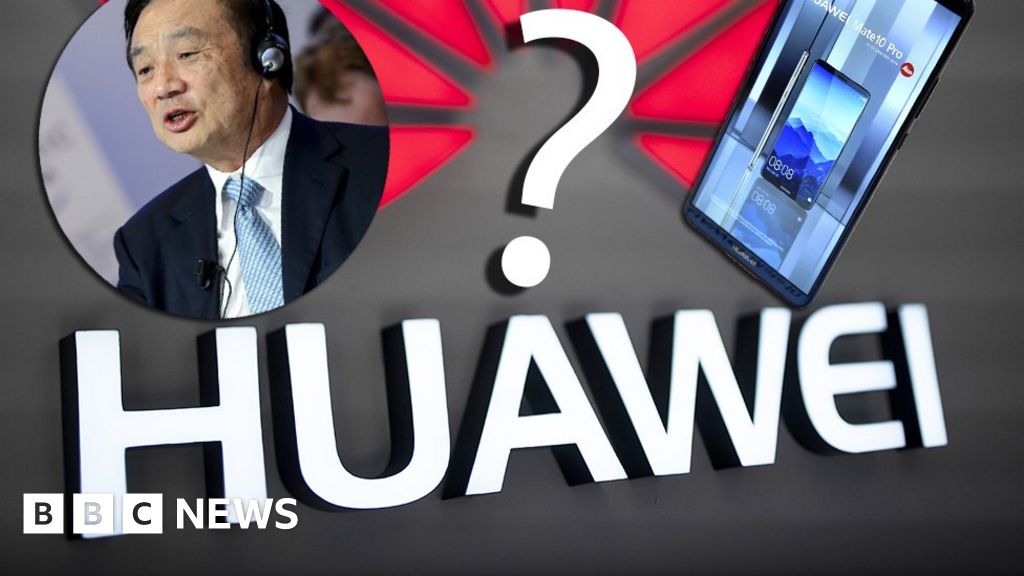Huawei: A Simple Guide To Why The Company Is In So Much Trouble

 Image copyright
Getty Images
Image copyright
Getty Images
A lot of people are talking about Huawei - and not just because they make really well reviewed, top-end phones.
The Chinese company is in pretty hot water in various places, because certain people believe they are using their tech to spy on people - something the company totally denies.
There's a court case against Huawei taking place in the US right now.
And other countries all over the world are losing faith in this tech giant due to security fears.
But although it can be quite hard to care about the ins and outs of a technology company on the other side of the planet - you might be worried about your handset or whether to buy a new Huawei.
So here's a quick explanation of what's going on.
What is Huawei?
First of all, it's pronounced "Wah-way" and Huawei sells more mobile phones across the world than Apple.
Samsung sell the most, with Huawei clocking in as the second most popular.
In the UK, there was a huge jump in sales of Huawei handsets in 2018 when they released their P20 Pro.
According to many reviewers Huawei's P20 Pro, which was released in 2018, is a real contender to the other big hitters - a Samsung or an iPhone.
But as well as the phones we've got in our pockets, Huawei also provide technology to other companies to make their own handsets and wi-fi networks.
Basically, Huawei is everywhere.
Why is everyone talking about Huawei?
There are some worries about what Huawei has been doing with the millions of mobile phones it's sold and all that tech kit.
Some countries fear Huawei is being used by the Chinese government to spy on people.
The man who founded Huawei, Ren Zhengfei, was an engineer in the Chinese People's Liberation Army in the early 1980s - a fact which has worried businesses and governments already distrustful of China's political leaders.
The Chinese People's Liberation Army is the armed force of the Communist Party of China, which has ruled the People's Republic of China since 1921.
Huawei says it has no links to the government and insists it is an independent company.
But there have been warnings in the US since 2012 that Huawei pose a security threat.
And in the UK, a report in 2018 said it had "only limited assurance" that Huawei's broadband and mobile equipment wasn't a threat to national security - which isn't exactly a glowing endorsement.
OK, who else is involved?
It's not just the US and UK who are starting to get a bit concerned.
In 2018, both Australia and New Zealand excluded Huawei from involvement in it's future 5G network - again because they think the company might be trying to spy on them.
In January 2019, Vodafone "paused" the use of Huawei equipment in Europe (specifically Spain) because they had the same worries.
What's happening now?
There is a court case taking place in America, in which Huawei is accused of bank fraud, obstruction of justice and theft of technology from rival T-Mobile - so nothing to do with spying on people.
Some of these allegations relate to deals reportedly done by Huawei with Iran - and Donald Trump has said that companies who trade with Iran cannot also trade with America.
Meng Wanzhou, Huawei's chief financial officer and the daughter of Ren Zhengfei, has been arrested by US officials for her involvement in evading President Trump's sanctions against Iran.
Huawei deny all the charges.
What does this mean if you're reading this on a Huawei?
Most of the worries about Huawei relate to their involvement in other companies' networks, not digging through the personal details of people who've snapped up a P20.
And it's important to remember there are no spying charges against the company, even in the case that's happening in the US right now - and no-one has been found guilty of anything.
Follow Newsbeat on Instagram, Facebook and Twitter.
Listen to Newsbeat live at 12:45 and 17:45 every weekday on BBC Radio 1 and 1Xtra - if you miss us you can listen back here.
From Chip War To Cloud War: The Next Frontier In Global Tech Competition
The global chip war, characterized by intense competition among nations and corporations for supremacy in semiconductor ... Read more
The High Stakes Of Tech Regulation: Security Risks And Market Dynamics
The influence of tech giants in the global economy continues to grow, raising crucial questions about how to balance sec... Read more
The Tyranny Of Instagram Interiors: Why It's Time To Break Free From Algorithm-Driven Aesthetics
Instagram has become a dominant force in shaping interior design trends, offering a seemingly endless stream of inspirat... Read more
The Data Crunch In AI: Strategies For Sustainability
Exploring solutions to the imminent exhaustion of internet data for AI training.As the artificial intelligence (AI) indu... Read more
Google Abandons Four-Year Effort To Remove Cookies From Chrome Browser
After four years of dedicated effort, Google has decided to abandon its plan to remove third-party cookies from its Chro... Read more
LinkedIn Embraces AI And Gamification To Drive User Engagement And Revenue
In an effort to tackle slowing revenue growth and enhance user engagement, LinkedIn is turning to artificial intelligenc... Read more

